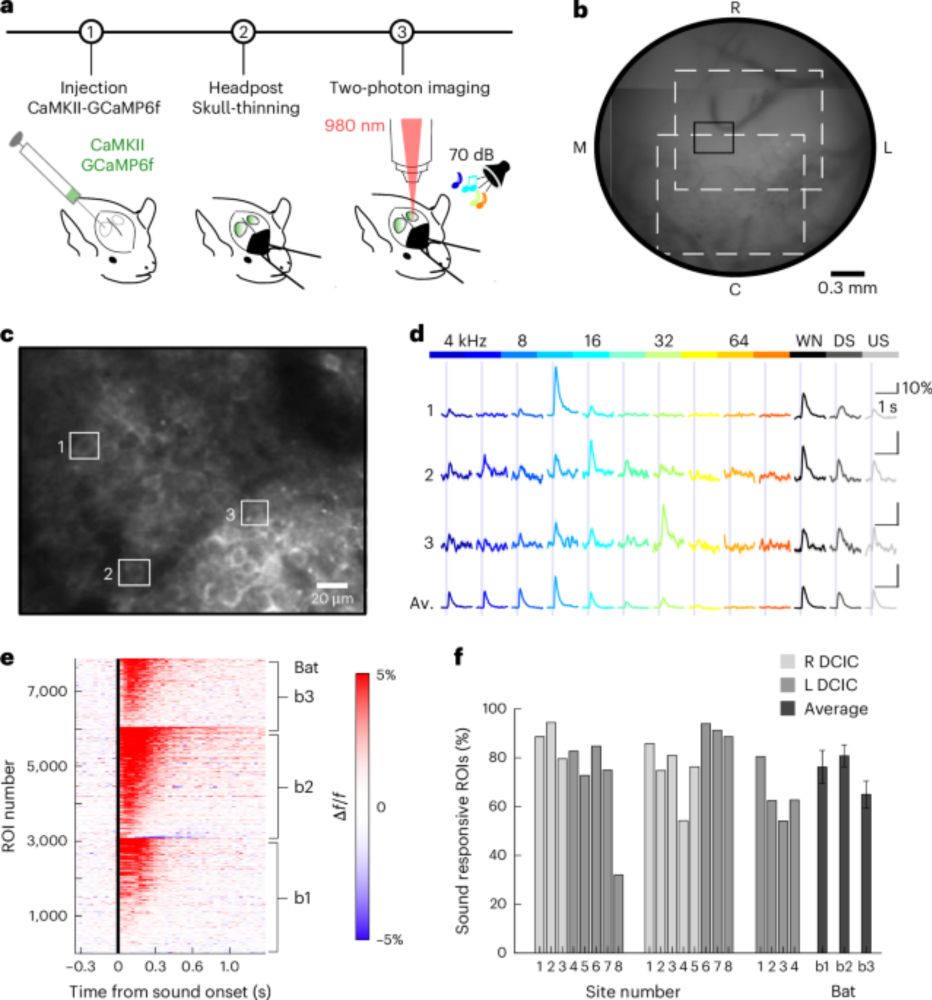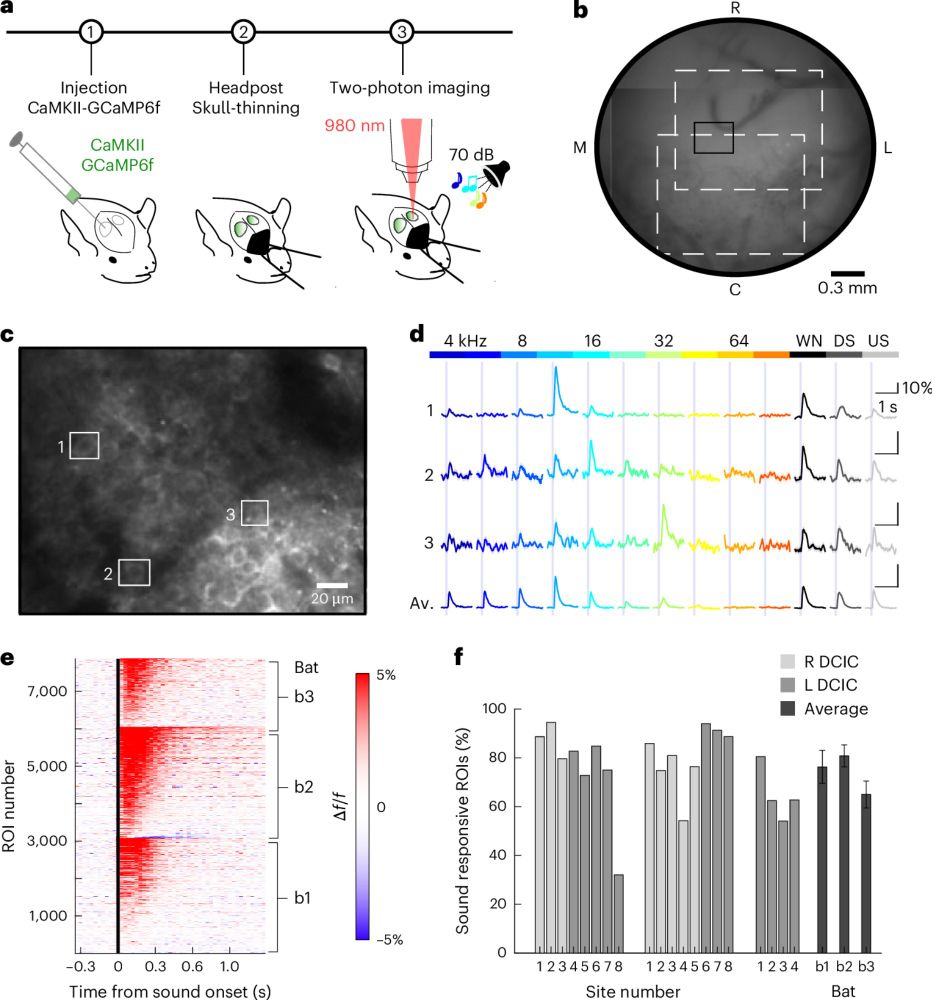🚨 We’re hiring a postdoc! 🚨
Excited for our new NiCE grant with @lauerlab.bsky.social @batwoman123.bsky.social 🎉We use a comparative approach, two-photon imaging & optogenetics to identify why bats🦇 and deer mice resist noise but lab mice don't.
If you're interested, please DM or e-mail me!
04.09.2025 16:24 — 👍 16 🔁 8 💬 0 📌 0
Work from @kishoreneuro.bsky.social and Moss labs shows that the 🦇 midbrain contains spatially clustered neurons that categorize vocalizations, suggesting our brains may start making sense of communication sounds earlier in the auditory pathway❗️Kudos to Jenni for leading such exceptional work 👏🏽
14.04.2025 15:38 — 👍 4 🔁 1 💬 0 📌 0
https://hub.jhu.edu/2025/04/08/kishore-kuchibhotla-federal-funding/?utm_source=Hub+-+Synced+List&utm_campaign=dfb98ecdcc-EMAIL_CAMPAIGN_2025_02_11_06_03_COPY_01&utm_medium=email&utm_term=0_3aa22d10c7-...
This is basic science in a non-traditional species ... but it may have implications for speech processing in lower auditory areas in humans some day. See this short piece for my thoughts on discovery-based science, universities, and federal funding: t.co/jJgOOv9em6
14.04.2025 12:20 — 👍 4 🔁 1 💬 0 📌 0
Huge thanks to BRAIN initiative and NIH funding and to amazing collaborators, @cynthiamoss.bsky.social and Mel Wohlgemuth!
14.04.2025 12:20 — 👍 3 🔁 0 💬 1 📌 0
if you read, and say 'well but a lot of things can be better with federal funding or academia', I agree. but i also don't think we need to caveat everything each time we talk about the good that comes from universities
09.04.2025 14:58 — 👍 2 🔁 0 💬 0 📌 0
Wrote this short piece for our university newsletter (the Hub) in defense of curiosity and the partnership between Universities and federal government
09.04.2025 14:58 — 👍 7 🔁 1 💬 1 📌 0
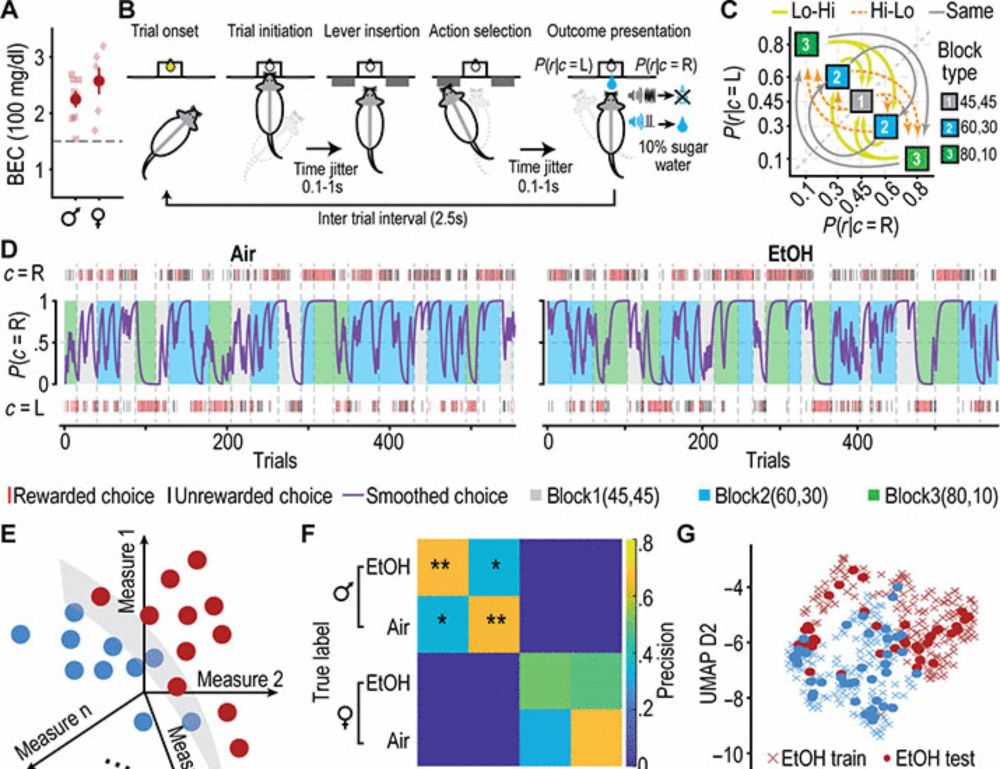
Chronic ethanol exposure produces sex-dependent impairments in value computations in the striatum
Chronic ethanol exposure disrupts adaptive decision-making and striatal neurocomputations in a sex-dependent manner.
Thrilled to share our work in ScienceAdvances: “Chronic ethanol exposure produces sex-dependent impairments in value computations in the striatum.” Huge thanks to Tricia @janaklab.bsky.social, Daeyeol @ungteoriz.bsky.social, Angela, and my friend Robin!
www.science.org/doi/full/10....
02.04.2025 21:03 — 👍 25 🔁 11 💬 1 📌 0
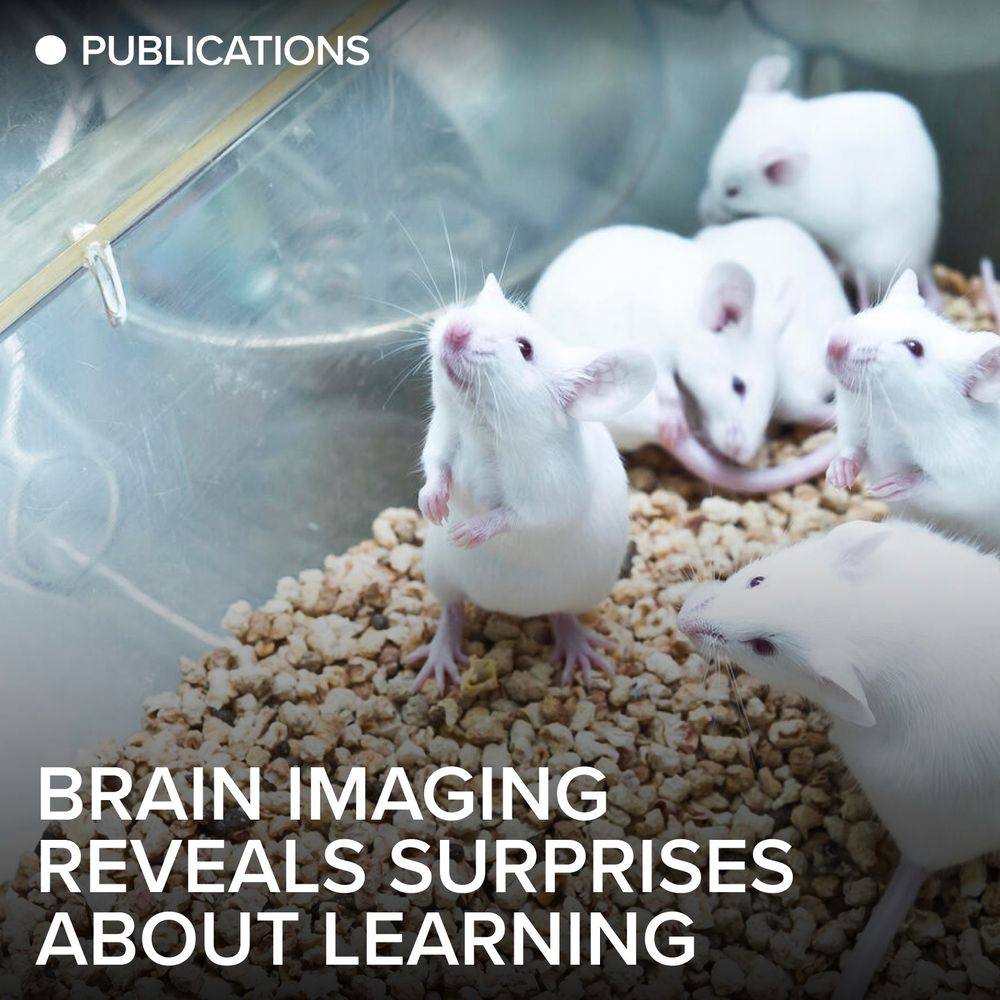
Researchers for first time use brain activity to determine why mice make mistakes.
Article link: tinyurl.com/bdcra73e
"We could tell if the animal was making a mistake or just wanted to give the other option a shot," says senior author Kishore Kuchibhotla. @kishoreneuro.bsky.social
27.03.2025 16:47 — 👍 5 🔁 2 💬 0 📌 0
Thanks Livia!
23.03.2025 10:06 — 👍 0 🔁 0 💬 0 📌 0
Thanks @ioanacarcea.bsky.social !!
22.03.2025 18:40 — 👍 0 🔁 0 💬 0 📌 0
TLDR, we propose that the sensory cortex is better described as a ‘sensory-enriched associative cortex’ whereby sensory, associative, and performance functions are intermingled (i.e. co-existing in the same network and neurons) but are computationally separable
21.03.2025 22:48 — 👍 5 🔁 0 💬 0 📌 0
Thrilled to share the latest paper from the lab! Huge congrats to first author Dr. Celine Drieu and the amazing team of Ziyi Zhu, Sarah Elnozahy, Joy Wang, Aaron Wang, and Kylie Fuller! Lots of fun stuff in the paper so check it out - and let us know what you think :)
21.03.2025 21:06 — 👍 50 🔁 18 💬 1 📌 1
4/ We trained mice on a modified auditory go/no-go task that uses simple pure tone cues (to avoid complex/perceptual processing by the auditory cortex) that allows us to dissociate rapid learning (acquisition of contingencies) from slower performance gains 🐭📈
21.03.2025 21:03 — 👍 0 🔁 0 💬 0 📌 0
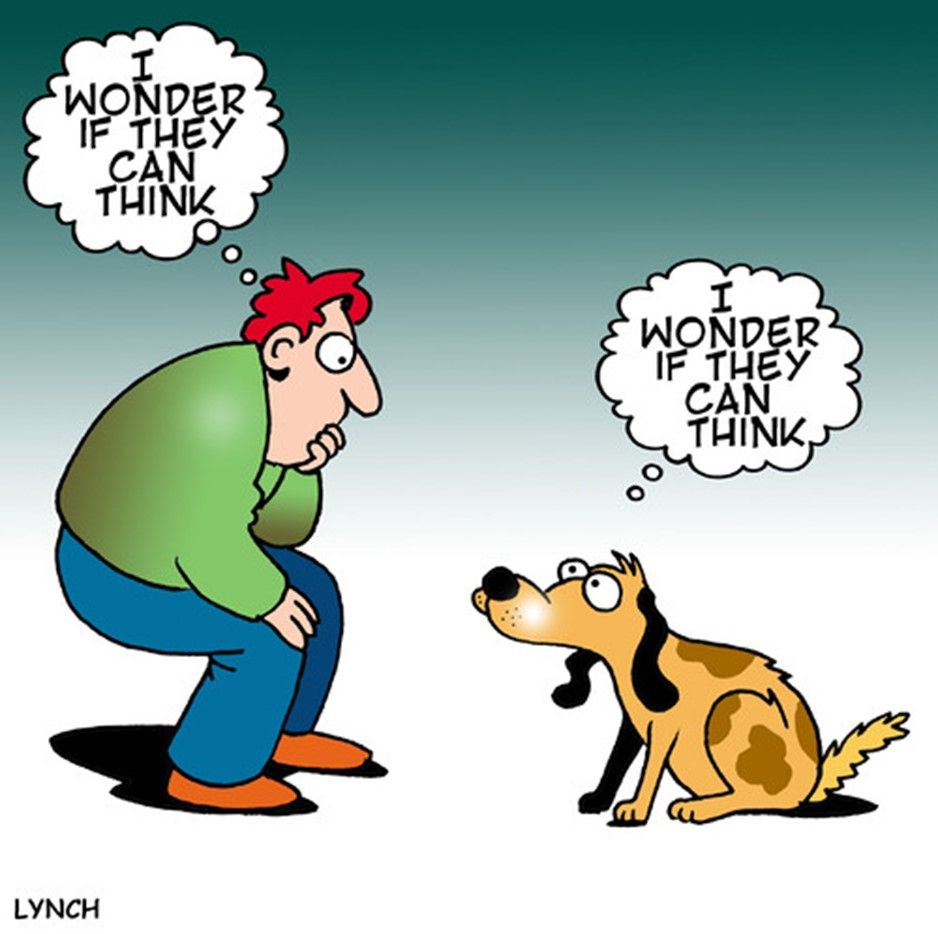
3/ But anyone who has trained animals in the lab (or pets at home!) probably has had the intuition that they sometimes know more than they let on🤔
21.03.2025 21:03 — 👍 0 🔁 0 💬 1 📌 0
2/ We often equate learning and performance in the lab leading to the view that learning even simple sensorimotor tasks can take forever. This slow learning is thought to be supported by a gradual expansion of predictive cue representation in the sensory cortex
21.03.2025 21:03 — 👍 0 🔁 0 💬 1 📌 0
1/ A century ago, Tolman showed that meaningful learning can occur even without apparent performance improvements. What is the neural basis of this distinction between learning something vs learning to perform? We tackle this in a new manuscript 🔥 🐭🔬📰
21.03.2025 21:03 — 👍 0 🔁 0 💬 1 📌 0
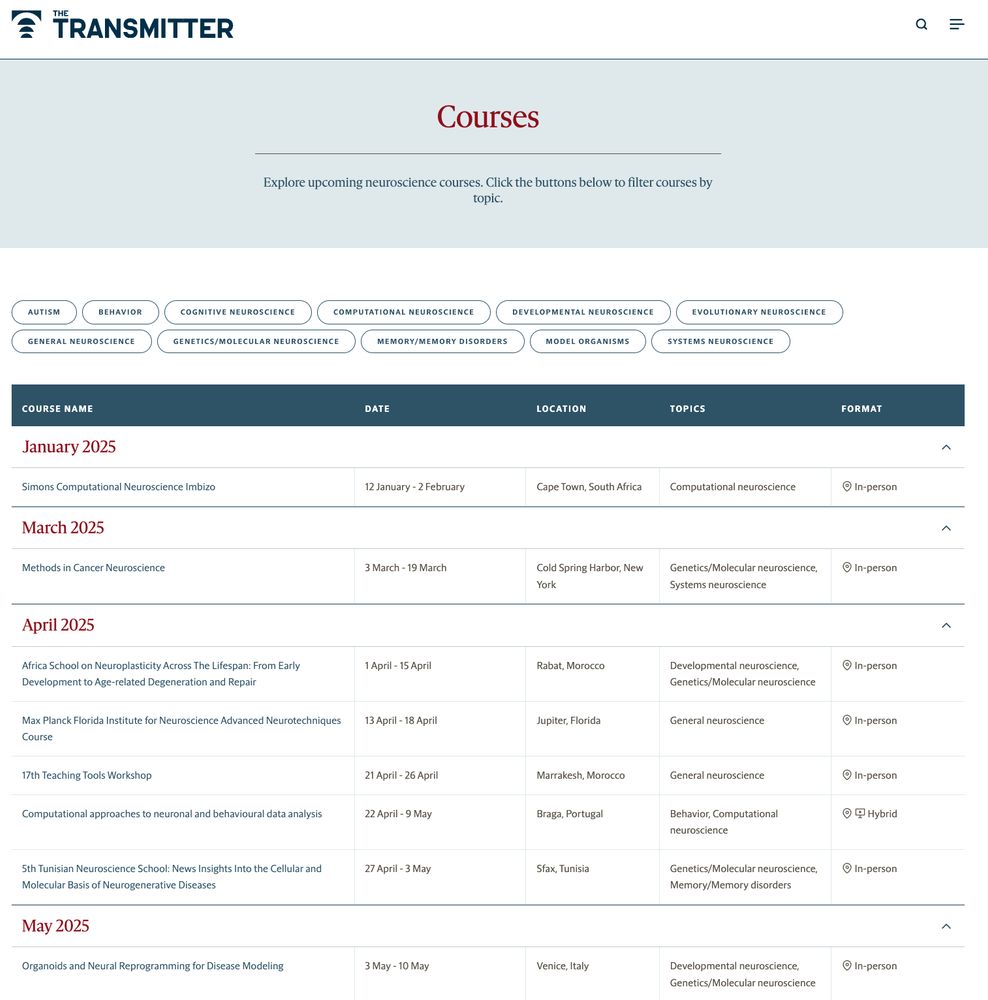
Visit our new courses calendar, where we highlight the top neuroscience courses that should be on your radar. You can filter your search by topic.
www.thetransmitter.org/courses/?utm...
#neuroskyence
13.01.2025 15:41 — 👍 29 🔁 6 💬 1 📌 1
Neuroscientist studying interactions between cognition, action & timing
Lab website: neuroact.in
Group Leader | NeuroACTLab @NCBS_Bangalore | SCAgingBrain fellow ➡️ faculty | Previously: @Neuro_CF @UCSF @UniofOxford @IiserMohali
#OptoGRC2026 May 10-15, 2026 | @okaysteve.bsky.social, @bjmarlin.bsky.social, @tinakim-neuro.bsky.social & gisellavetere.bsky.social
🔗: www.grc.org/optogenetic-approaches-to-understanding-neural-circuits-and-behavior-conference/2026/
Neurobiologist, Professor, fond of reading, cats, thrillers, and food
Neuron never get lost cuz it always find its own pathway. Rookie researcher with heart love of deciphering the mind.
Hopkins | Kavli NDI
Temporal Decision Making, Neural representations of time, timing, and time evolving value
https://sites.google.com/site/marshallshuler/
Kurt Golcuk, Elissa Sutlief, Charlie Walters, Rebekah Zhang, Shichen Zhang, Ziyi Guo, Jiayi Chen
Group leader @MPI for Metabolism Research, Cologne. We study synaptic plasticity during the postpartum. https://www.sf.mpg.de/valtcheva
Neuroscientist at U Chicago
Computational & Systems Neuroscience (COSYNE) Conference
🧠🧠🧠
Next: Mar 27-April 1 2025, Montreal/Tremblant
🧠🧠🧠
Here too:
@CosyneMeeting@neuromatch.social
@CosyneMeeting on Twitter
Neuroscientist @__NERF | @BiologyKULeuven | @VIBLifeSciences | @leuvenbrainins1. Opinions my own. https://bsky.app/profile/boninlab.bsky.social
We are a global leader in research and education into the mind and brain.
www.ucl.ac.uk/brain-sciences
Bluesky in Barcelona
Computational Neuroscience & Natural and Artificial Intelligence
Serra Hunter Professor
Center for Brain and Cognition, Universitat Pompeu Fabra
https://sites.google.com/view/morenobotecompneuro?pli=1
Computational neuroscientist and complexity scientist. Professor at Ghent University.
Asst Professor Psychology & Data Science @ NYU | Working on brains & climate, separately | Author of Models of the Mind: How physics, engineering, and mathematics have shaped our understanding of the brain https://shorturl.at/g23c5 | Personal account (duh)
Interested in cognitive processes, neural circuits, philosophical constructs, economic theories and computational models of choice. And in a few other things.
Scientist at Champalimaud Foundation (polaviejalab.org) and co-founder of Algebraic AI (algebraic.ai). #Maths4AI #AI4Science, #BehaviorAI #NeuroAI #CognitionAI #CollectiveBehavior
Theoretical/Computational neuroscientist at Harvard Medical School | Algorithms and neural implementation of reasoning under uncertainty | Decision-making and navigation.
https://www.drugowitschlab.org/
Professor in Computational Neuroscience at Imperial College London
Assistant Professor in Computational Neuroscience @ UCLA
dipoppalab.com
